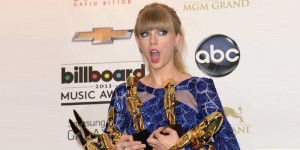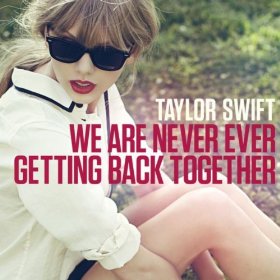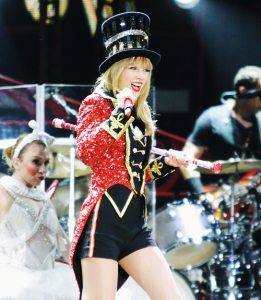“We Are Never Ever Getting Back Together” (2012) – Taylor Swift
In 2012, Taylor Swift set the record for the most digital sales of a song by a woman with her single “We Are Never Ever Getting Back Together.” The hit single from Swift’s fourth album RED, is a song that bids adieu to an ex-lover, Swift promises that they won’t ever be getting back together…like ever. Swift’s charismatic voice and slightly sassy conversational tone rule this song, proving that the boy who treated her wrong won’t ever be back in her life. The song was her first to peak at number one on Billboard Hot 100 and also topped Billboard’s Top Country Songs for nine consecutive weeks. Swift’s goodbye-boy song also made its way to Time magazine’s Top 10 Songs of 2012, a list noted to be the best songs put out that year. The song was an instant success with her fans (I being one of them). This era, if you will, of Taylor Swift’s career was focused around creating a new sound. This new sound is most prevalent in “We Are Never Ever Getting Back Together” and has created quite the controversy on what is and what isn’t country music – with Swift in the hot seat.
The song begins with a hard-to-ignore poppy undertone categorized by its very synthesized guitar playing that obviously has the help of computer-generation (think the chorus of “Like A Prayer” by Madonna). This caught the attention of pretty much the entire world, including the country and pop music genres. A girl from Nashville starts to sing “I remember when we broke up – the first time / saying this is it, I’ve had enough – because like / we hadn’t seen each other in a month – when you, said you, needed space – what” and the Hollywood stars aligned at the voice of a new crossover hit song. Swift, pop country sensation, at the time had only produced country albums but when she began to create RED she started to experiment with pop music. “I was getting my ideas the same way I always did and then a few months in they started coming to me as pop melodies and I could not fight it and I just embraced it,” Taylor explained in an interview with Grammy Pro. RED and “We Are Never Ever Getting Back Together” would be the first time for Taylor Swift to work with producer Max Martin, a Swedish music producer and songwriter who worked with pop acts such as Backstreet Boys and Britney Spears. Swift said she was only “allowed” to work with Martin on a couple of songs including “WANEGBT,” with her record company worrying she was straying too far from what she was known for. However, Swift’s desire to create pop music with RED did not overpower her desire to make her relationships she’s made through country music stronger by coming through with good country music material which created what she called a “multiple personality” album. This stemmed from the fact that the album had a wide variety of genre representation in the songs, although, listed as country, it was borderline not country.
“WANEGBT” is a light-hearted song that is written in a very conversational manner. The song is sung from the perspective of Swift as if she is singing to the boy that she is obviously never getting back together with – she’s not even contemplating it anymore, they’re over. “I’m really gonna miss you picking fights – and me / falling for it screaming that I’m right – and you / would hide away and find your peace of mind / with some – indie record that’s much cooler than mine,” she sings very sarcastically. Her somewhat catty lyrics throughout the song leave listeners wishing they knew whom she was talking about so they could break that indie record into tiny pieces. It’s safe to say that audiences tend to flock to Taylor’s break-up hits but this one is unlike other ones she had done in the past. Its up-beat tempo and use of distortion are things that we didn’t typically see from Taylor in her earlier break-up hits.
TS decided to play it safe when creating RED by labeling it a country album but putting blatantly pop songs on the record. This decision was most definitely influenced by who Swift was becoming; she arrived on the music scene as an innocent 15-year-old country sweetheart and had been made into a 22-year-old superstar by the time RED was released. Time changed her, her fans and her music. That being said, Swift’s intentions with this song are pretty out in the open; she wanted to explore the area of the pop sound while making a country record. However, not all critics and listeners were open to this play on genres. With other popular country hits in 2012 such as, Josh Turner’s “Time Is Love” and Eric Church’s “Springsteen” country music listeners seemed hesitant to accept Swift’s “WANEGBT” into the same category of songs. Just a glimpse at the reviews of RED on iTunes proves that country music listeners were not pleased with this transition. “Her poppy, immature lead single scared me,” said user asdfghjkl24. Another user, ccjewell, said they were very disappointed with the outcome, “Taylor is supposed to be country and making an album with pop and “country” (if you can call is that) doesn’t work.” Although listeners who weren’t completely into the pop music scene disapproved of Taylor’s newest take on country-pop, others were pleased and loved the song and the album as a whole. User, myyheartisyourss, said “Hearing RED, it seems to play to everyone. She has brought back her sweet folk sound from her first self titled album yet combined it with bits of rock, dub step, ukulele, and pop to bring us this fantastic masterpiece.” The user praises the star and continues, “Taylor is brilliant to bring in all the different writers and production to add a freshness to her sound.” Although the overall perceptions of the album were conflicting, it was, at the time, Taylor’s best one on the charts. Taylor’s intentions worked in her favor and rather than reaching one audience, she reached many – something her predominantly country record label was proved wrong about. The iTunes description of the album perfectly states, “The banjo pluck of the title track and acoustic ballad ‘All Too Well’ will resonate with country fans, but glossy singles like “We Are Never Ever Getting Back Together” and “I Knew You Were Trouble” seem destined for a broader audience – one that’s just as vivid as the title suggests.”
“We Are Never Ever Getting Back Together” is set up like most of Swift’s other songs, verse-chorus-bridge format. This format works well for her storytelling purposes. Boy, does she know how to tell a story. In this song, the format helps in enabling the listener to get very involved. The verses are similar in style and have the same background instrumentals allowing the listener (or person singing along would probably be a better term) to catch on to how Swift is telling the story pretty quickly. The bridge of this song is different from most Swift-like things because she talks it rather than sings it. “uhhh (she sighs) so he calls me up and he’s like, I still love you / And I’m like, I just, I mean this is exhausting, you know / like we are never getting back together – like ever.” This simple factor makes the listener feel like Swift is talking right to them, explaining just what’s going on in her love life. (Honestly who doesn’t dream of that being a real life occurrence?) This element is foreign to country music, but relates heavily to the pop sound she’s going for. The writing and the set up of this song came easily, as one would imagine they would for someone who writes songs for a living. Taylor explained to MTV that this song was created when someone who knew an ex-boyfriend of hers (rumored to be Jake Gyllenhaal) walked in to the studio, in which she and producer Max Martin were working, and hinted at a rumor of her and him getting back together. Her response to this accusation was, you guessed it, WE ARE NEVER EVER GETTING BACK TOGETHER. Martin encouraged her to write a song about the relationship she felt so passionately about finalizing and thus the first single of her fourth album was born. If this doesn’t scream “TAYLOR SWIFT,” I don’t know what does. It seems as though even with a change of sound Swift keeps her songwriting consistent, which makes her more relatable and her fans happy.

Swift takes the 2013 Billboard Music Awards by storm, including an award for Best Country Song for “WANEGBT.”
“WANEGBT” pushed the envelope for Taylor Swift and she definitely created a no-boundary zone for herself when it came to writing and making music. This song won accolades as a country song as well as a pop song, proving that genre is based on varying perspectives. The popularity of this song and other similar songs on RED influenced Taylor to create one of the best-selling records of all time 1989, that is solely a pop album. “We Are Never Ever Getting Back Together” is to thank for pushing Taylor Swift out into the superstardom she has today. She broke the limits and for that country and pop music should both be thankful for.
| Time | Section | Listening Cues | Discussion |
| 0:00 | Intro | Guitar | The tone of the song is set with the upbeat melody played on the guitar and distortion. The song will follow this melody throughout. |
| 0:05 | Verse 1 | “I remember when we broke up the first time…” | Drums are prevalent here. Swift emphasizes the words “the first time” and “because like” at the end of their lines. Then breaks up fourth line of the verse into two syllable phrasing “when you – said you – needed – space what” |
| 0:16 | Verse 2 | “Then you come around again and say…” | Swift follows the same pattern as first verse. Emphasizes the words at the end of each line “baby” “trust me.” The breaks up the fourth line into three syllable phrasing “I say – I hate you – we break up – you call me – I love you” The song thrives on many of these choppy phrases. |
| 0:27 | Pre-chorus | “Oooh, we called it off again…” | Instrumentals are built up in this line. Swift also begins to sing louder and more fluidly – without the special phrasing seen in the verses. |
| 0:38 | Chorus | “We are never, ever, ever…” | It’s almost as if there’s a period after the first “We” – said very abruptly. Second and third “We” is very drawn out – “weeeeee.” Instrumentals are almost silenced on last “getting back together.” |
| 1:02 | Interlude | Guitar | The initial guitar melody picks back up after the chorus. Swift talks the words “like ever” in a very sassy tone. |
| 1:06 | Verse 3 | “I’m really gonna miss you picking fights…” | Swift follows the same verse patter as before. Emphasizes “and me” “and you” “with some” – doesn’t continue the paired syllable phrasing. Swift mentions the boy listening to “an indie record that’s much cooler than mine” in a very sarcastic and witty way – this is very much so a zinger. |
| 1:17 | Pre-chorus | “Oooh, you called me up again…” | Instrumentals are built up in this line. Swift also begins to sing louder and more fluidly – without the special phrasing seen in the verses. |
| 1:29 | Chorus | “We are never, ever, ever…” | It’s almost as if there’s a period after the first “We” – said very abruptly. Second and third “We” is very drawn out – “weeeeee.” “Getting back together” is drawn out on the end – Swift makes “together” a longer note and instrumentals become more prominent during this time. |
| 1:51 | Instrumental | “Ooh, yeah, ooh yeah, ooh yeah” | Swift’s “ooh”ing follows the beat of the instumentals that are most prominent. The instrumentals change a bit from the songs main guitar melody but still provide the same tone (upbeat, dance-y). |
| 2:03 | Bridge | “I used to think…” | Instrumentals are barely there. Swift sings in a softer tone that follows the stripped beat in the background. Last “never” is drawn out to provide contrast to next verse. Her vocals are distorted in this section. |
| 2:14 | Verse 4 | “*Sighs* So he calls me up…” | Original guitar melody is back. Swift talks the entire verse – as if she’s having a conversation with the listener. Repeats “like ever” from Interlude. |
| 2:25 | Chorus | “We are never, ever, ever…” | Chorus follows the same as previous ones with the addition of “ooh”s and “oh”’s accompanying Swift’s main vocals. Last “talk to me” is more emphasized than before – more like “meeeee.” “Getting back together” is extremely elongated making way to the following outro. |
| 2:49 | Outro | “We, oooh, getting back together…” | Swift sings select lines from chorus, without fully repeating chorus, in a more emphasized manner. Instrumentals end on last “ever” and Swift finishes “getting back together” without them. Song ends abruptly after “together.” |
Sources:
Brodsky, Rachel. “Taylor Swift Reveals Secrets Behind ‘We Are Never Ever Getting Back Together,’ Oozes Adorableness, Relatability On ‘MTV First'” MTV News. 30 Oct. 2012. Web. 28 Oct. 2015.
Caufield, Keith. “Official: Taylor Swift’s ‘Never’ Song Sells 623,000; Sets Female Digital Record.” Billboard. N.p., 21 Aug. 2012. Web. 28 Oct. 2015.
“Listening Session With Taylor Swift: 1989 | Part 1.” GRAMMYPro.com. N.p., n.d. Web. 28 Oct. 2015.
“Max Martin Production Discography.” Wikipedia. Wikimedia Foundation, n.d. Web. 28 Oct. 2015.
“Red by Taylor Swift on ITunes.” ITunes. 22 Oct. 2012. Web. 28 Oct. 2015.
Thompson, Gayle. “Taylor Swift, ‘We Are Never Ever Getting Back Together’ Breaks Country Chart Record.” The Boot. N.p., 10 Dec. 2012. Web. 28 Oct. 2015.
“Top 10 Songs.” Time Entertainment. N.p., 4 Dec. 2012. Web. 28 Oct. 2015.
“We Are Never Ever Getting Back Together.” Taylor Swift Wiki. N.p., n.d. Web. 28 Oct. 2015.
Wyland, Sarah. “Billboard’s Top 50 Country Songs of 2012.” Great American Country. 27 Dec. 2012. Web. 28 Oct. 2015.


